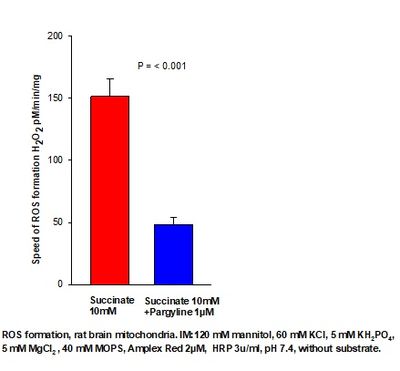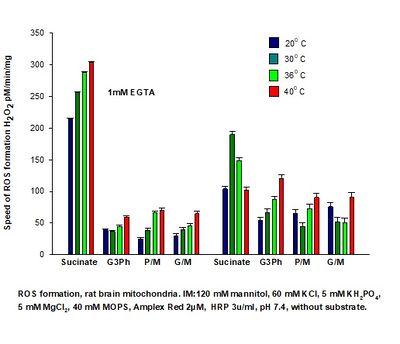Gainutdinov 2017 MITOEAGLE Obergurgl
| Different ways of reactive oxygen species (ROS) formation by brain mitochondria. |
Link: MitoEAGLE
Gainutdinov TM, Gizatullina ZZ, Kunz M, Karavassili N, Shagidullin RR, Gellerich FN (2017)
Event: MitoEAGLE Obergurgl 2017
The aim of this study is the determination of the mechanisms of ROS formation in the brain by mitochondria isolated from the mice and rat total brain, different parts of the brain, spinal cord using different substrates for OXPHOS and for mono amino oxidases (MAO). In parallel, the investigation of the role of Ca2+ in OXPHOS regulation [1], the detections of ROS formation (Amplex Red HRP method) and potential of mitochondrial membrane (safranin) with and without 1 mM EGTA using different temperatures conditions showed unexpected results. The Ca2+ dependent increase of ROS formation by 10 mM glutamate and 2mM malate, opposite to 1-10 mM sn-Glycerol 3-phosphate, decrease membrane potential in neuronal mitochondria that suggests the presence of two ways of electron transfer by Q10 from both sides of the inner membrane [2]. Inhibitions of MAO specific for MAO-B pargyline, selegiline and non-specific (MAO-A, MAO-B) curcumin have no effect on ROS formation with most known OXPHOS substrates but have 50-70% decrease with succinate. These results can explain unspecific high level of ROS formation’s speed by succinate [3,4] without presence of any effects on membrane potential. The temperature’s dependence of ROS formation with and without EGTA showed an unexpected linear tendency.
• Bioblast editor: Kandolf G
• O2k-Network Lab: DE Magdeburg Gellerich FN
Labels: MiParea: Respiration
Stress:Oxidative stress;RONS Organism: Mouse, Rat Tissue;cell: Nervous system Preparation: Isolated mitochondria
Pathway: N, S, Gp
Event: A1, Oral
Affiliations
- (1)Gainutdinov TM, (2)Gizatullina ZZ, (2)Kunz M, (2)Karavassili N, (1)Shagidullin RR, (2,3)Gellerich FN
- Inst Problems Ecol Mineral Wealth Use Tatarstan Acad Sciences, Kazan, Republic of Tatarstan, Russia
- Dept Neurol, Otto-von-Guericke-Univ, Magdeburg, Germany
- Leibniz Inst Neurobiol, Magdeburg, Germany
Figures
References
- Gellerich FN, Gizatullina Z, Gainutdinov T, Muth K, Seppet E, Orynbayeva Z, Vielhaber S (2013) The control of brain mitochondrial energization by cytosolic calcium: the mitochondrial gas pedal. IUBMB Life 65:180-90.
- Samorì B, Lenaz G, Battino M, Marconi G, Domini I (1992) On coenzyme Q orientation in membranes: a linear dichroism study of ubiquinones in a model bilayer. J Membr Biol 128:193-203.
- Shabalina IG, Nedergaard J (2011) Mitochondrial ('mild') uncoupling and ROS production: physiologically relevant or not? Biochem Soc Trans 39:1305-9.
- Panov A, Dikalov S, Shalbuyeva N, Hemendinger R, Greenamyre JT, Rosenfeld J (2007) Species- and tissue-specific relationships between mitochondrial permeability transition and generation of ROS in brain and liver mitochondria of rats and mice. Am J Physiol Cell Physiol 292:C708-18.

